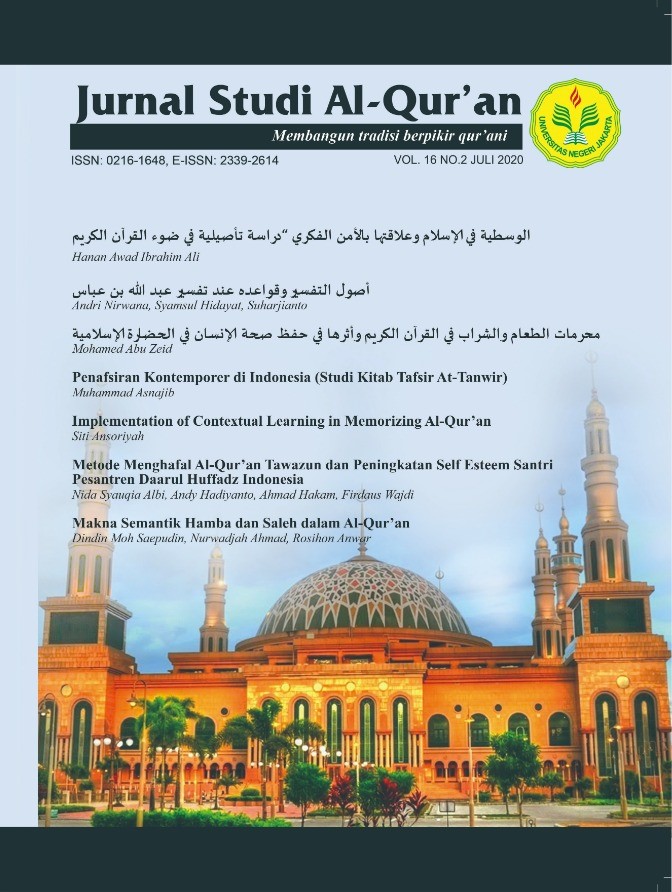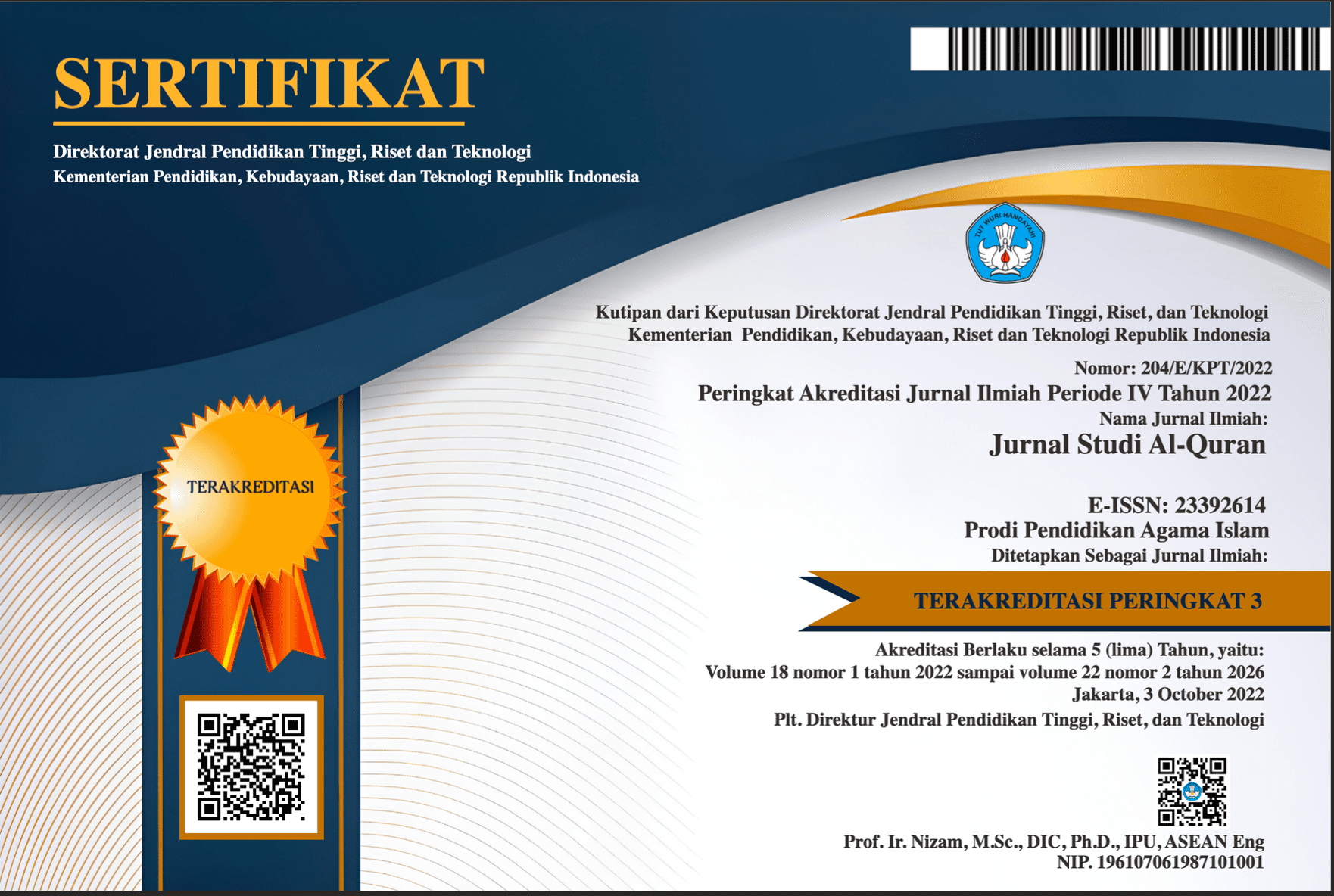محرمات الطعام والشراب في القرآن الكريم وأثرها في حفظ صحة الإنسان في الحضارة الإسلامية
DOI:
https://doi.org/10.21009/JSQ.016.2.03Keywords:
Food and drink taboos, the holy Qur'an, Islamic CicilizationAbstract
What was deprived of food and drink it was harmful to a person's health or himself. In this research, the researcher deals with the prohibitions of food and drink in the Holy Quran, as it explains how the ban of these beverages had a definite impact on the Islamic nation in the best conditions of physical and psychological health. This research will solve according to the inductive and descriptive approach, whereby the researcher will extrapolate the Quranic text and determine the prohibitions of foods and beverages in it, whether they are specific or outlined in the Quranic texts such as the prohibition of malice. The researcher will transfer the findings of Sharia scholars or natural sciences scientists from the harms of those taboos And its mental, psychological, and physical effects. He described the impact of the purity of Islamic society on these taboos on the development and advancement of Islamic civilization
References
AIP. (2010). Financial Performance Report 2009.
Arfah, S. R. (2012). Evaluasi Pemanfaatan Dana Bantuan Operasional Sekolah (BOS) Pada Kegiatan Pembelajaran di SD Inpres Tamajene Kota Makassar. UNHAS. Retrieved from http://repository.unhas.ac.id/handle/123456789/1671
Bendavid-hadar, I., & Ziderman, A. (2010). A New Model for Equitable and Effi cient Resource Allocation to Schools : The Israeli Case A New Model for Equitable and Efficient Resource Allocation to Schools : The Israeli Case, (4822).
Bray, M. (1998). Financing education in developing Asia: Themes, tensions, and policies. International Journal of Educational Research, 29(7), 627–642. https://doi.org/10.1016/S0883-0355(98)00053-6
Bray, M. (2000). Community partnerships in education: Dimensions, variations and implications, (April), 52 p.
Bray, M. (2002). The costs and financing of education: trends and policy implications. The Costs and Financing of Education: Trends and Policy Implications (Vol. 22). https://doi.org/10.1016/S0272-7757(03)00023-2
Cellini, S. R., Ferreira, F., &, & Rothstein, J. (2008). The Value of School Facilities: Evidence from a Dynamic ]Regression Discontinuity Design, 50. https://doi.org/10.3386/w14516
Creswell, J. W. (2010). Research Design. Yogyakarta: Pustaka Pelajar.
DBEI. (2011). Desentralisasi Manajemen dan Tatalayanan Pendidikan Dasar yang Lebih Efektif.
Deffous, E. (2011). Can school grants lead to school improvement? An overview of experiences of five countries.
Denzin, N. K & Lincoln, Y. S. (2009). Memasuki Bidang Penelitian Kualitatif. Yogyakarta: Pustaka Pelajar.
Fattah, N. (2009). Ekonomi dan Pembiayaan Pendidikan. Bandung: PT. Remaja Rosdakarya.
Firman, H. &, & Tola, B. (2008). The Future of Schooling in Indonesia. Journal of International Cooperation in Education, 11(1), 71–84. Retrieved from http://s3.amazonaws.com/academia.edu.documents/35520130/11-1Firman_Tola.pdf?AWSAccessKeyId=AKIAJ56TQJRTWSMTNPEA&Expires=1475938043&Signature=fa3vwUN5erzedvhQ3w04pffEKAI=&response-content-disposition=inlinefilename=The_Future_of_Schooling_in_Indonesia.pd
Ghozali, A. (2005). Analisis Biaya Satuan Pendidikan Dasar dan Menengah. Jakarta: Badan Penelitian dan Pengembangan, Departemen Pendidikan Nasional.
Hallak, J. (1985). Analisis Biaya dan Pengeluaran Untuk Pendidikan. Jakarta: Bhratara Karya Aksara.
Hartono, D., & Ehrmann, D. (2001). The Indonesian Economic Crisis and its Impact on Educational Enrolment and Quality. Institute of Southeast Asian Studies, (7), 182. Retrieved from http://www.iseas.edu.sg/trends721.pdf%5Cnhttp://citeseerx.ist.psu.edu/viewdoc/download?doi=10.1.1.203.5662&rep=rep1&type=pdf
Idris, R. (2010). APBN pendidikan dan mahalnya biaya pendidikan. Lentera Pendidikan, 13(1), 92–110.
IIEP. (2007). Corrupt Schools, Corrupt Universities: What Can Be Done? Paris.
Janesick, V. J. (2009). Tarian Desain Penelitian Kualitatif: Metafora, Metodolatri dan Makna. In Handbook of Qualitative Research. Yogyakarta: Pustaka Pelajar.
Karding, A., K. (2008). Evaluasi Pelaksanaan Program Bantuan Operasional Sekolah ( Bos ). Pasca Sarjana UnDip, 1–151.
Kurniady, D. A. (2011). Pengelolaan pembiayaan sekolah dasar di kabupaten bandung. Jurnal Penelitian Pendidikan, 12(1), 34–51.
McMahon, W. W., & Appiah, E. (2001). The Social Benefits of Education in Indonesia Communities.
McMahon, W. W., Suwaryani, N., & B. (2001). Improving Education Finance in Indonesia.
McMahon, W. W., & Boediono. (2001). Improving Education Funding Methods in Indonesia. Urbana.
McMahon, W. W. (2001). An Adequate Education for Each Child. Urbana.
Muller, T. R. (2011). Introduction to Human Resource Development Versus The Right to Education: Journal of International Development.
Mulyono, M. (2010). Konsep Pembiayaan Pendidikan. Jogjakarta: Ar Ruzz Media.
NCEE. (2017). Japan: System and School Organization. Retrieved from http://ncee.org/what-we-do/center-on-international-education-benchmarking/top-performing-countries/japan-overview/japan-system-and-school-organization/
Nur, A. S. (2001). Perbandingan Sistem Pendidikan 15 Negara. Bandung: Lubuk Agung.
Ombudsman. (2013a). Ombudsman Rilis 50 Sekolah Pungli. Retrieved from http://www.ombudsman.go.id/index.php/en/beritaartikel/berita/779-ombudsman-rilis-50-sekolah-pungli.html
Ombudsman. (2013b). Terkait Pungutan Sumbangan Pembangunan Sekolah Ombudsman Sidak SMA Negeri 4 Makassar. Retrieved from http://www.ombudsman.go.id/index.php/en/beritaartikel/berita/758-terkait-pungutan-sumbangan-pembangunan-sekolah-ombudsman-sidak-sma-negeri-4-makassar-.html
Paqueo, V., & Sparrow, R. (2005). Free Basic Education in Indonesia : Policy Scenarios and Implications for School Enrolment.
Psacharopoulos, G. (1994). Returns to Investment in Education: A Global Update. Elsevier, 22 No.9.
Psacharopoulos, G. (1995). The Profitability of Investment in Education: Concepts and Methods, 1–22. https://doi.org/10.1017/CBO9781107415324.004
Psacharopoulos, G. (1996). Economics of Education : A Research Agenda, (4), 339–344.
Ross, K. N., & Levacic, R. (1999). Conclusion. In K. N. Ross & R. Levacic (Eds.), Need Basic Resource Allocation in Education. Paris.
Safaat, G. (2008). Implementasi Kebijakan Pendidikan Gratis Sekolah Dasar dan Madrasah Ibtidaiyah di Kabupaten Pandeglang. Jurnal Niagara, Vol.1 No.1.
Saputra, W., Tasya, A.Y., & Andrean, J. (2006). PEMBIAYAAN PENDIDIKAN INDONESIA: MENUJU MILLINEUM DEVELOPMENT GOALS (MDGs) 2015. Pkmi-2-1-1Saputra, W., Tasya, A. Y., & Andrean, J. (2010). PEMBIAYAAN PENDIDIKAN INDONESIA: MENUJU MILLINEUM DEVELOPMENT GOALS (MDGs) 2015. Pkmi-2-1-1, 1–12. https://doi.org/10.1017/CBO9781107415324.004, 1–12. https://doi.org/10.1017/CBO9781107415324.004
Shoraku, A. (2008). Educational movement toward school-based management in East Asia: Cambodia, Indonesia and Thailand. Background Paper for EFA Global Monitoring Report. Retrieved from http://unesco.atlasproject.eu/unesco/file/d0b7b767-9e2b-4e2a-bff0-783b6ae6f15b/c8c7fe00-c770-11e1-9b21-0800200c9a66/178720e.pdf
Supriadi, D. (2003). Satuan Biaya Pendidikan. Bandung: PT Remaja Rosda Karya.
Telstar. (2011). Dana Rp13,8 Miliar Mengendap di Disdik. Retrieved from http://www.telstarfm.com/berita_info/lintasan_102.7/832/dana_rp138_miliar_mengendap_di_disdik_
The World Bank. (2008). World Development Indicators. Database.
Toyamah, N., & Usman, S. (2004). Alokasi Anggaran Pendidikan di Era Otonomi Daerah: Implikasinya terhadap Pengelolaan Pelayanan Pendidikan Dasar. Education Budget Allocation in the Era of Regional Autonomy: Its Implications on Basic Education Service Management] Laporan Lapangan SMERU. Lembaga Penelitian SMERU, Jakarta.
Yin, R. K. (2003). Studi Kasus (Desain dan Metode). Jakarta: PT Raja GrafindoPersada.
Downloads
Published
How to Cite
Issue
Section
License
Authors who publish with this Journal agree to the following terms:
- Author retain copyright and grant the journal right of first publication with the work simultaneously licensed under a creative commons attribution licensethat allow others to share the work within an acknowledgement of the work’s authorship and initial publication of this journal.
- Authors are able to enter into separate, additional contractual arrangementfor the non-exclusive distribution of the journal’s published version of the work (e.g. acknowledgement of its initial publication in this journal).
- Authors are permitted and encouraged to post their work online(e.g. in institutional repositories or on their websites) prior to and during the submission process, as it can lead to productive exchanges, as well as earlier and greater citation of published works.
Users/public use of this website will be licensed to CC BY










